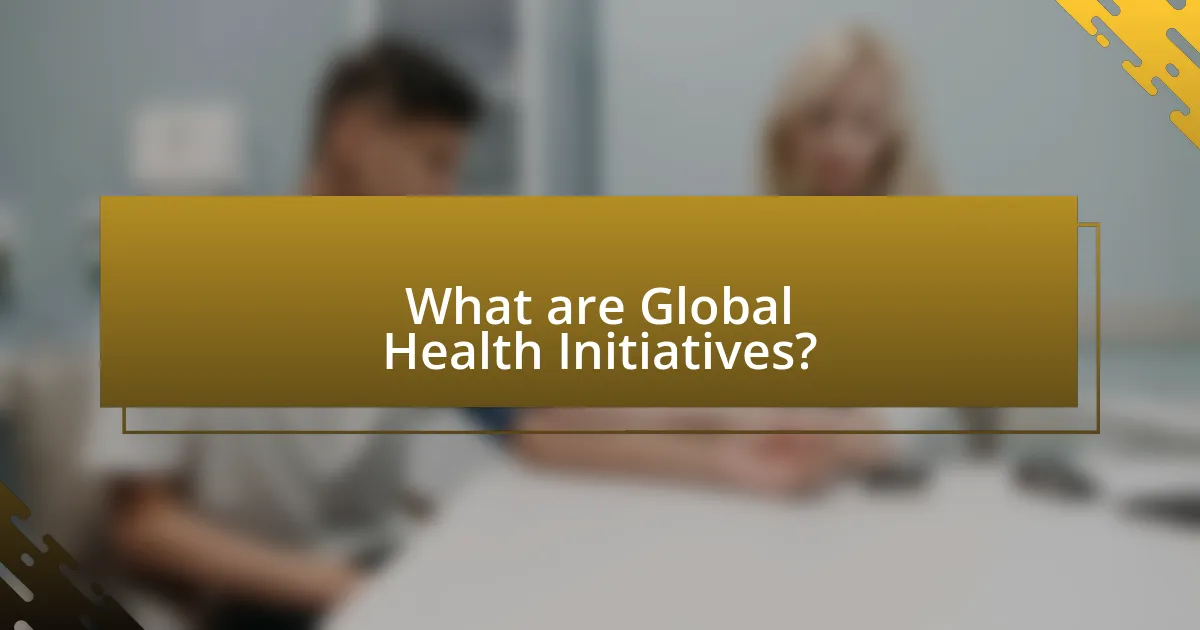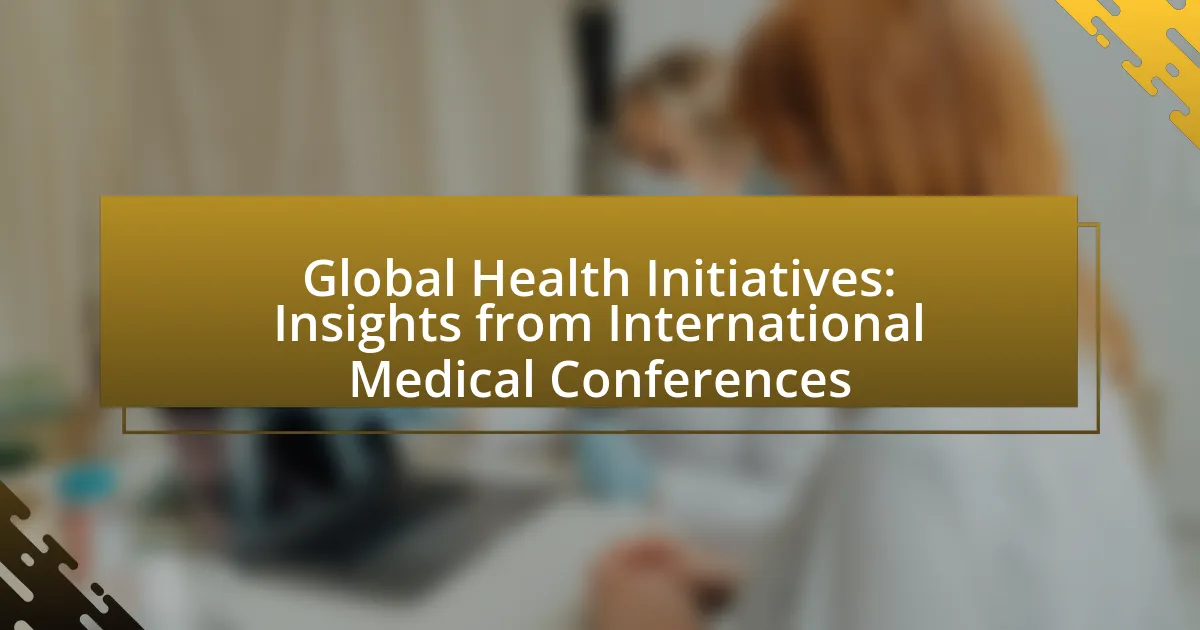Global Health Initiatives are organized efforts aimed at enhancing health outcomes globally, focusing on disease prevention, health education, and access to healthcare services. This article explores the impact of these initiatives, such as the Global Fund to Fight AIDS, Tuberculosis and Malaria, which has significantly reduced mortality rates and improved health systems. It also examines the role of International Medical Conferences in facilitating collaboration, sharing best practices, and shaping health policies, while addressing current health challenges and innovations in healthcare. Key themes include the importance of funding, stakeholder collaboration, and strategies for sustainability in global health efforts.

What are Global Health Initiatives?
Global Health Initiatives are coordinated efforts aimed at improving health outcomes on a global scale, often addressing issues such as disease prevention, health education, and access to healthcare services. These initiatives typically involve collaboration among governments, non-governmental organizations, and international agencies to tackle pressing health challenges, such as infectious diseases, maternal and child health, and health system strengthening. For example, the Global Fund to Fight AIDS, Tuberculosis and Malaria has mobilized over $45 billion since its inception in 2002 to combat these diseases worldwide, demonstrating the significant impact of such initiatives on global health.
How do Global Health Initiatives impact global health outcomes?
Global Health Initiatives significantly improve global health outcomes by addressing critical health issues through coordinated efforts and resource allocation. These initiatives, such as the Global Fund to Fight AIDS, Tuberculosis and Malaria, have led to a 38% reduction in AIDS-related deaths since 2005, demonstrating their effectiveness in combating infectious diseases. Additionally, initiatives like Gavi, the Vaccine Alliance, have facilitated the immunization of over 822 million children, preventing millions of deaths and improving overall public health. By mobilizing funding, fostering international collaboration, and implementing evidence-based strategies, Global Health Initiatives play a crucial role in enhancing health systems and achieving better health outcomes worldwide.
What are the key objectives of Global Health Initiatives?
The key objectives of Global Health Initiatives are to improve health outcomes, enhance health systems, and promote health equity across populations. These initiatives aim to address global health challenges such as infectious diseases, maternal and child health, and non-communicable diseases by mobilizing resources, fostering international collaboration, and implementing evidence-based interventions. For instance, the Global Fund to Fight AIDS, Tuberculosis and Malaria has significantly reduced mortality rates from these diseases by providing funding and support to countries in need, demonstrating the effectiveness of coordinated global efforts in achieving health objectives.
How do these initiatives address health disparities?
Global health initiatives address health disparities by implementing targeted programs that focus on underserved populations, improving access to healthcare services, and promoting health equity. For example, initiatives often provide resources such as vaccinations, maternal health services, and education on disease prevention in low-income areas, which historically experience higher rates of illness and mortality. According to the World Health Organization, these targeted efforts have led to a significant reduction in preventable diseases in vulnerable communities, demonstrating the effectiveness of such initiatives in bridging health gaps.
Why are International Medical Conferences important for Global Health Initiatives?
International Medical Conferences are crucial for Global Health Initiatives because they facilitate knowledge exchange, collaboration, and innovation among healthcare professionals worldwide. These conferences provide a platform for sharing the latest research findings, best practices, and emerging health challenges, which are essential for addressing global health issues effectively. For instance, the World Health Organization reported that such gatherings have led to significant advancements in disease prevention strategies and health policy formulation, ultimately improving health outcomes in various regions.
What role do these conferences play in shaping health policies?
International medical conferences play a crucial role in shaping health policies by facilitating dialogue among stakeholders, including policymakers, healthcare professionals, and researchers. These conferences provide a platform for sharing the latest research findings, best practices, and innovative solutions to global health challenges. For instance, the World Health Assembly, held annually, influences health policy decisions by presenting evidence-based recommendations that member states often adopt into their national health strategies. Additionally, conferences often result in the formation of collaborative networks that advocate for specific health issues, thereby driving policy changes at both national and international levels.
How do they facilitate collaboration among health professionals?
Global health initiatives facilitate collaboration among health professionals by providing platforms for networking, knowledge sharing, and joint problem-solving. These initiatives often organize international medical conferences that bring together diverse stakeholders, including doctors, researchers, policymakers, and public health officials, to discuss pressing health issues and share best practices. For instance, the World Health Organization (WHO) hosts global forums that encourage interdisciplinary collaboration, leading to the development of comprehensive health strategies and policies. Such collaborative efforts have been shown to enhance the effectiveness of health interventions, as evidenced by the successful eradication of diseases like smallpox through coordinated global efforts.

What are the major themes discussed in International Medical Conferences?
The major themes discussed in International Medical Conferences include advancements in medical technology, public health strategies, disease prevention and control, global health policy, and collaborative research efforts. These themes reflect the ongoing evolution of healthcare practices and the importance of international cooperation in addressing health challenges. For instance, conferences often highlight innovations such as telemedicine and artificial intelligence in diagnostics, which are crucial for improving patient outcomes. Additionally, discussions on public health strategies emphasize the need for effective responses to pandemics, as evidenced by the global focus on COVID-19 preparedness and vaccination efforts.
How do emerging health threats influence conference agendas?
Emerging health threats significantly influence conference agendas by prioritizing discussions on urgent public health issues. For instance, the COVID-19 pandemic led to a rapid shift in conference topics, emphasizing infectious disease control, vaccine development, and global health preparedness. This shift is evidenced by the World Health Organization’s Global Health Summit in 2021, which focused on pandemic response strategies, showcasing how real-time health crises can reshape the focus of international medical conferences.
What are the most pressing health issues currently addressed?
The most pressing health issues currently addressed include the COVID-19 pandemic, mental health crises, and non-communicable diseases such as diabetes and cardiovascular diseases. The COVID-19 pandemic has highlighted the need for robust public health systems and vaccine distribution strategies, as evidenced by the global vaccination efforts that have administered over 13 billion doses worldwide. Mental health issues have surged, with reports indicating a 25% increase in anxiety and depression during the pandemic, necessitating urgent mental health support and resources. Additionally, non-communicable diseases account for 71% of global deaths, prompting initiatives focused on prevention and management strategies to combat these chronic conditions.
How do conferences adapt to new health challenges?
Conferences adapt to new health challenges by implementing hybrid formats, enhancing digital engagement, and prioritizing health protocols. For instance, many conferences now offer virtual attendance options alongside in-person participation, allowing broader access while minimizing health risks. Additionally, organizers often incorporate real-time health updates and safety measures, such as social distancing and sanitation stations, to ensure participant safety. The World Health Organization has noted that adapting to health challenges is crucial for maintaining the continuity of knowledge sharing and collaboration in the medical field, especially during global health crises like the COVID-19 pandemic.
What innovations in healthcare are highlighted at these conferences?
Innovations in healthcare highlighted at these conferences include advancements in telemedicine, artificial intelligence in diagnostics, and personalized medicine. Telemedicine has expanded access to care, allowing patients to consult healthcare providers remotely, which has been crucial during the COVID-19 pandemic. Artificial intelligence is being utilized to enhance diagnostic accuracy, with algorithms capable of analyzing medical images and predicting patient outcomes. Personalized medicine focuses on tailoring treatments based on individual genetic profiles, improving efficacy and reducing adverse effects. These innovations are supported by data showing increased patient satisfaction and improved health outcomes, demonstrating their significance in modern healthcare.
Which technologies are transforming global health initiatives?
Digital health technologies, including telemedicine, mobile health applications, and artificial intelligence, are transforming global health initiatives. Telemedicine enables remote consultations, improving access to healthcare in underserved areas, while mobile health applications facilitate health monitoring and education. Artificial intelligence enhances data analysis for disease prediction and management, as evidenced by its use in predicting outbreaks and optimizing resource allocation. These technologies collectively improve healthcare delivery, accessibility, and efficiency on a global scale.
How are best practices shared among participants?
Best practices are shared among participants through structured networking sessions, workshops, and collaborative platforms during international medical conferences. These events facilitate direct interaction, allowing healthcare professionals to exchange knowledge and experiences. For instance, the World Health Organization often organizes panel discussions and breakout sessions where experts present case studies and successful strategies, enabling participants to learn from real-world applications. Additionally, digital platforms and social media are increasingly used to disseminate information and foster ongoing dialogue post-conference, ensuring that best practices continue to circulate within the global health community.

What are the outcomes of Global Health Initiatives discussed at conferences?
The outcomes of Global Health Initiatives discussed at conferences include improved collaboration among countries, enhanced funding for health programs, and the establishment of new health policies. These initiatives often lead to the sharing of best practices and innovative solutions to global health challenges, as evidenced by the commitments made during the World Health Assembly, where member states pledged to increase investment in universal health coverage. Additionally, conferences like the Global Health Summit have resulted in concrete action plans, such as the commitment to vaccinate 70% of the world’s population against COVID-19 by mid-2022, demonstrating the tangible impact of these discussions on global health strategies.
How are the successes of these initiatives measured?
The successes of global health initiatives are measured through specific metrics such as health outcomes, program reach, and cost-effectiveness. Health outcomes are evaluated by tracking changes in disease prevalence, mortality rates, and improvements in quality of life among target populations. Program reach is assessed by the number of individuals served and the geographical areas covered, while cost-effectiveness is analyzed by comparing the costs of interventions to the health benefits achieved. For instance, the World Health Organization often utilizes these metrics to evaluate initiatives like vaccination programs, demonstrating their impact through statistical data on immunization rates and subsequent declines in disease incidence.
What metrics are used to evaluate health improvements?
Metrics used to evaluate health improvements include morbidity and mortality rates, quality-adjusted life years (QALYs), and patient-reported outcomes. Morbidity and mortality rates provide quantitative measures of disease incidence and death, reflecting the effectiveness of health interventions. Quality-adjusted life years (QALYs) assess the value of health outcomes by combining the quantity and quality of life lived, allowing for comparisons across different health interventions. Patient-reported outcomes capture individuals’ perceptions of their health status, offering insights into the impact of treatments on daily living. These metrics are widely recognized in global health initiatives and are essential for assessing the effectiveness of health programs and policies.
How do participant feedback and data influence future initiatives?
Participant feedback and data significantly influence future initiatives by providing actionable insights that guide decision-making processes. For instance, feedback collected from participants at international medical conferences can highlight areas of improvement, such as the effectiveness of specific programs or the relevance of topics discussed. This data-driven approach allows organizers to tailor future initiatives to better meet the needs and expectations of participants, thereby enhancing engagement and outcomes. Research indicates that organizations that systematically analyze participant feedback can increase satisfaction rates by up to 30%, demonstrating the tangible benefits of incorporating such insights into planning.
What challenges do Global Health Initiatives face?
Global Health Initiatives face significant challenges including funding limitations, coordination among diverse stakeholders, and varying health system capacities across countries. Funding limitations often hinder the implementation and sustainability of health programs, as evidenced by the Global Fund to Fight AIDS, Tuberculosis and Malaria reporting a $14 billion funding gap for 2020-2022. Coordination among stakeholders, such as governments, NGOs, and private sectors, can lead to inefficiencies and fragmented efforts, complicating the delivery of health services. Additionally, varying health system capacities create disparities in access to care and resources, as highlighted by the World Health Organization’s findings that low-income countries often lack essential health infrastructure compared to high-income nations.
How do funding and resource allocation impact these initiatives?
Funding and resource allocation significantly impact global health initiatives by determining the scope, reach, and effectiveness of programs. Adequate funding enables the implementation of comprehensive health strategies, such as vaccination campaigns and disease prevention programs, which can lead to improved health outcomes. For instance, the Global Fund to Fight AIDS, Tuberculosis and Malaria reported that its investments have saved over 38 million lives since 2002, demonstrating the direct correlation between financial resources and health improvements. Conversely, insufficient funding can lead to limited access to essential services, reduced program sustainability, and ultimately, poorer health outcomes in vulnerable populations. Thus, the allocation of resources directly influences the success and longevity of health initiatives on a global scale.
What barriers exist in implementing health programs globally?
Barriers in implementing health programs globally include inadequate funding, lack of infrastructure, cultural resistance, and political instability. Inadequate funding often leads to insufficient resources for program development and sustainability, as evidenced by the World Health Organization’s report indicating that low-income countries face a funding gap of approximately $66 billion annually for health services. Lack of infrastructure, such as poor transportation and communication systems, hampers the delivery of health services, particularly in rural areas. Cultural resistance can arise from differing beliefs and practices regarding health, which can impede community acceptance of health initiatives. Political instability disrupts governance and resource allocation, making it challenging to maintain consistent health programs. These factors collectively hinder the effectiveness and reach of global health initiatives.
What practical steps can be taken to enhance Global Health Initiatives?
To enhance Global Health Initiatives, stakeholders should prioritize collaboration among governments, NGOs, and private sectors to create unified health strategies. This collaboration can lead to resource sharing, knowledge exchange, and coordinated responses to health crises, as evidenced by the successful partnerships formed during the COVID-19 pandemic, which facilitated rapid vaccine development and distribution. Additionally, investing in health infrastructure, particularly in low-resource settings, is crucial; for instance, the World Health Organization reported that every $1 invested in health systems can yield $10 in economic returns. Furthermore, implementing data-driven approaches to monitor health outcomes and adapt strategies accordingly can significantly improve the effectiveness of health initiatives, as demonstrated by the Global Burden of Disease Study, which provides comprehensive data to inform health policy decisions.
How can stakeholders collaborate more effectively?
Stakeholders can collaborate more effectively by establishing clear communication channels and shared goals. Effective collaboration requires regular meetings and updates to ensure all parties are aligned on objectives and progress. Research indicates that structured collaboration frameworks, such as the Collaborative Governance Framework, enhance stakeholder engagement and decision-making in global health initiatives. This framework emphasizes transparency, mutual respect, and shared responsibility, which are crucial for fostering trust and cooperation among diverse stakeholders.
What strategies can be employed to ensure sustainability of initiatives?
To ensure the sustainability of initiatives, organizations should implement strategies such as stakeholder engagement, continuous funding mechanisms, and capacity building. Stakeholder engagement fosters collaboration and support, which is essential for long-term success; for example, initiatives that involve local communities often see higher rates of adoption and sustainability. Continuous funding mechanisms, such as establishing partnerships with private sectors or securing government grants, provide the financial stability needed to maintain operations over time. Capacity building, which includes training local personnel and developing infrastructure, ensures that initiatives can operate independently and effectively without ongoing external assistance. These strategies have been validated by various studies, including the World Health Organization’s report on sustainable health initiatives, which emphasizes the importance of community involvement and resource allocation for lasting impact.

Leave a Reply